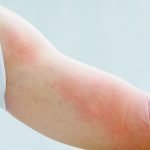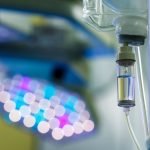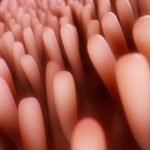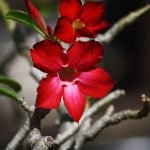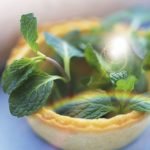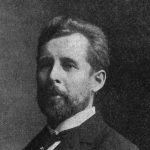Herbal Medicines for Hair Loss
Jillian Stansbury, ND
In addition to genetic predisposition to androgenic alopecia and poor circulatory health, stress may exacerbate the process. Acute stress causes hair loss in animals and humans. One investigation of serum cortisol levels and glucocorticoid receptor expression in patients with severe alopecia areata showed a lower expression of glucocorticoid receptors compared to controls1; researchers believe this contributes to pathological changes in the scalp that promote alopecia. Therefore, adaptogenic and nervine herbs might be included in formulas for patients with hair loss where stress and adrenal activation are suspected to play a role.Male-pattern baldness – referred to medically as androgenetic alopecia – involves a slow transformation of large, scalp hair follicles into shorter, thinner, vellus hairs. The major mechanisms that contribute to hair loss in genetically predisposed individuals include rapid shifts in hormone levels (such as in menopause and andropause), loss of extracellular matrix proteins in the follicular bed, poor circulation to the scalp, and localized microinflammation. The most active form of testosterone, 5α-dihydrotestosterone, aggravates genetically-programmed scalp hair follicles to stop producing “normal” head hair, and instead produce fine, miniaturized vellus hairs.
5α-Reductase Inhibitors to Slow Hair Loss
The steroid metabolizing enzyme, 5α-reductase, reduces the double bonds of some steroids, including testosterone. This process converts testosterone to the more active 5α-dihydrotestosterone, sometimes referred to as DHT. Therefore, inhibiting the 5α-reductase enzyme will reduce testosterone’s stimulation of sensitive tissues and be therapeutic for benign prostatic hyperplasia, alopecia, hirsutism in women, and prostate cancer. Agents that inhibit 5α-reductase are considered to be among the most effective treatments of androgenic alopecia; finasteride is a leading pharmaceutical agent in this group. The side effects of pharmaceutical 5α-reductase inhibitors are usually minimal with short term use; however, prolonged use may have significant adverse effects on sexual function, such as erectile dysfunction and diminished libido.2 Thus far, such side effects have not been reported with herbal 5α-reductase inhibitors.
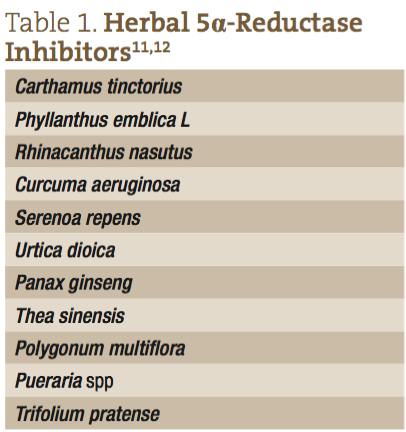 Many herbs and their constituents have been shown to be natural 5α-reductase inhibitors (Table 1); an example is the green tea catechin, epigallocatechin gallate.3 Procyanidin oligomers – the red, blue, and purple pigment common in blueberries, pomegranates, and other berries – may promote hair growth via selective inhibition of protein kinase C.4 One study showed procyanidins to have the greatest effect on hair growth compared to other flavonoids.5 Other flavonoids that potently inhibit type 1 5α-reductase include myricetin, quercetin, and baicalein, whereas biochanin, daidzein, genistein, and kaempferol inhibit type 2 5α-reductase3; both type 1 and type 2 are important in androgenic alopecia. Many legume family herbs, such as Trifolium and Pueraria, are 5α-reductase inhibitors due to the genistein and daidzein they contain. The topical application of Trifolium pratense (red clover) has been found to retard hair loss in human subjects experiencing a receding hair line.6 Topical Trifolium also reduced inflammatory reactions and stimulated extracellular matrix protein synthesis in the vicinity of hair follicles.6 Panax ginseng ginsenosides are credited with 5α-reductase inhibition7 and may have a proliferative effect on human hair dermal papilla cells, as evidenced by increased hair growth when applied topically in animal models of androgenic alopecia.8 Polygonum multiflorum is a 5α-reductase inhibitor9 and is an Asian traditional medicine for baldness. Polygonum multiflora has been shown in mice to promote hair growth by inducing the anagen phase in resting hair follicles.10
Many herbs and their constituents have been shown to be natural 5α-reductase inhibitors (Table 1); an example is the green tea catechin, epigallocatechin gallate.3 Procyanidin oligomers – the red, blue, and purple pigment common in blueberries, pomegranates, and other berries – may promote hair growth via selective inhibition of protein kinase C.4 One study showed procyanidins to have the greatest effect on hair growth compared to other flavonoids.5 Other flavonoids that potently inhibit type 1 5α-reductase include myricetin, quercetin, and baicalein, whereas biochanin, daidzein, genistein, and kaempferol inhibit type 2 5α-reductase3; both type 1 and type 2 are important in androgenic alopecia. Many legume family herbs, such as Trifolium and Pueraria, are 5α-reductase inhibitors due to the genistein and daidzein they contain. The topical application of Trifolium pratense (red clover) has been found to retard hair loss in human subjects experiencing a receding hair line.6 Topical Trifolium also reduced inflammatory reactions and stimulated extracellular matrix protein synthesis in the vicinity of hair follicles.6 Panax ginseng ginsenosides are credited with 5α-reductase inhibition7 and may have a proliferative effect on human hair dermal papilla cells, as evidenced by increased hair growth when applied topically in animal models of androgenic alopecia.8 Polygonum multiflorum is a 5α-reductase inhibitor9 and is an Asian traditional medicine for baldness. Polygonum multiflora has been shown in mice to promote hair growth by inducing the anagen phase in resting hair follicles.10
Improving Scalp Circulation to Allay Hair Loss
Minoxidil is a vasodilating pharmaceutical that improves circulation to the follicles and may slow or stop hair loss and promote hair regrowth when applied topically. Minoxidil is a potassium-channel opener, causing hyperpolarization of cell membranes; this promotes vasodilation, allowing more oxygen, blood, and nutrient delivery to the follicle. Minoxidil must be applied once or twice daily to achieve results, and must be continued to maintain the effects. Allergic contact dermatitis may result from minoxidil use, and some patients experience hair loss rather than hair growth.13
The turmeric relative, Curcuma aeruginosa, is a natural agent that inhibits 5α-reductase. One multicenter, randomized, double-blind, placebo-controlled study showed that the herb combined with minoxidil boosted the efficacy of the medicine in slowing hair loss and stimulating hair regrowth.14 Natural agents that have vasodilating effects may also have therapeutic activity, from topical arginine to counter-irritants such as Capsicum and warming volatile oils. Scalp massage and hydrotherapy to the head are other natural means of improving circulation to the hair follicles.
Herbal Hair Washes to Promote Hair Growth
Numerous studies have shown the topical application of the legume family herbs, and others, to promote hair growth. Carnosic acid in Rosmarinus inhibits 5α-reductase, and the topical use of Rosmarinus officinalis leaf extract has been shown to promote hair regrowth in animals, where hair loss was induced by the administration of testosterone.15 Topical application of green tea on the scalp may protect the hair follicles from normal skin aging that contributes to male-pattern hair baldness.16 One plant that I have become familiar with from my studies in the Amazon is Hura crepitans, sometimes processed for its fixed oil known as Hura oil. This oil is shown to balance ratios between neurotrophin – a naturally occurring compound – and androgens in a manner that induces hair growth.17 The Bora tribe, with whom I study, prepares a hair wash from the bark that is used prior to important festivals and celebrations to make the hair thick and shiny.
Herbs with Effects on Keratinocytes
Hair loss can be accompanied by apoptosis of keratinocytes. Eclipta alba and Angelica are examples of herbs noted to have protective and proliferative effects on keratinocytes. Angelica applied topically has been shown to promote hair growth and enhance the size of hair follicles, as well as the length of hair shaft, in animal models of androgenic alopecia.18 Eclipta alba is used traditionally to promote hair growth and has been shown in animal models to stimulate and proliferate follicular keratinocytes.19 Topical application of Eclipta has also been shown to promote hair growth in mice with genetic hair loss related to abnormal keratinization.20
Other Traditional Remedies for Hair Loss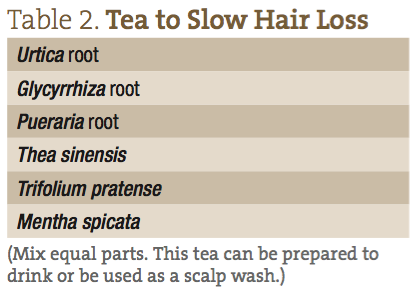
Among other miscellaneous therapies to treat skin diseases of the scalp and/or to promote hair growth is phototherapy. The use of ultraviolet light, in tandem with photosensitizers, may stimulate hair growth in some alopecia patients.21 Psoralen is one of the most commonly used photosensitizers.
Mentha spicata (spearmint) may reduce hirsutism in women with elevated androgens,22 and may therefore be helpful for male-pattern baldness as well, though this has yet to be researched. Cepharanthine is an alkaloid found in Stephania cepharantha that has been used traditionally for a wide variety of chronic illnesses in Japan, as well as alopecia. Cepharanthine inhibits numerous inflammatory mediators which may help protect hair follicles.23 The topical application of Chrysanthemum flavonoids promotes hair growth in animal studies.24 Thuja orientalis is a traditional medicine for hair loss in East Asia, and the topical use of hot water extracts has been shown to promote hair growth in animal studies.25
 Jillian Stansbury, ND, has practiced in SW Washington for nearly 20 years, specializing in women’s health, mental health, and chronic disease. She holds undergraduate degrees in medical illustration and medical assisting, and graduated with honors in both programs. Dr Stansbury also chaired the botanical medicine program at NCNM and has taught the core botanical curricula for more than 20 years. In addition, Dr Stansbury writes and serves as a medical editor for numerous professional journals and lay publicans, plus teaches natural products chemistry and herbal medicine around the country. At present, she is working to set up a humanitarian service organization in Peru and studying South American ethnobotany. She is the mother of 2 adult children, and her hobbies include art, music, gardening, camping, international travel, and the study of quantum and metaphysics.
Jillian Stansbury, ND, has practiced in SW Washington for nearly 20 years, specializing in women’s health, mental health, and chronic disease. She holds undergraduate degrees in medical illustration and medical assisting, and graduated with honors in both programs. Dr Stansbury also chaired the botanical medicine program at NCNM and has taught the core botanical curricula for more than 20 years. In addition, Dr Stansbury writes and serves as a medical editor for numerous professional journals and lay publicans, plus teaches natural products chemistry and herbal medicine around the country. At present, she is working to set up a humanitarian service organization in Peru and studying South American ethnobotany. She is the mother of 2 adult children, and her hobbies include art, music, gardening, camping, international travel, and the study of quantum and metaphysics.
References
Chne X, Chen D, Chen J, Wei J. Serum cortisol and peripheral blood mononuclear cell glucocorticoid receptor mRNA expression in severe alopecia areata with liver-kidney deficiency syndrome. Nan Fang Yi Ke Da Xue Xue Bao. 2012;32(2):230-233.
Traish AM, Hassani J, Guay AT, et al. Adverse side effects of 5α-reductase inhibitors therapy: persistent diminished libido and erectile dysfunction and depression in a subset of patients. J Sex Med. 2011;8(3):872-884.
Hiipakka RA, Zhang HZ, Dai W, et al. Structure-activity relationships for inhibition of human 5alpha-reductases by polyphenols. Biochem Pharmacol. 2002;63(6):1165-1176.
Takahashi T, Kamimura A, Shirai A, et al. Several selective protein kinase C inhibitors including procyanidins promote hair growth. Skin Pharmacol Appl Skin Physiol. 2000;13(3-4):133-142.
Takahashi T, Kamiya T, Hasegawa A, Yokoo Y. Procyanidin oligomers selectively and intensively promote proliferation of mouse hair epithelial cells in vitro and activate hair follicle growth in vivo. J Invest Dermatol. 1999;112(3):310-316.
Loing E, Lachance R, Ollier V. A new strategy to modulate alopecia using a combination of two specific and unique ingredients. J Cosmet Sci. 2013;64(1):45-58.
Murata K, Takeshita F, Samukawa K, et al. Effects of ginseng rhizome and ginsenoside Ro on testosterone 5α-reductase and hair re-growth in testosterone-treated mice. Phytother Res. 2012;26(1):48-53.
Park S, Shin WS, Ho J. Fructus panax ginseng extract promotes hair regeneration in C57BL/6 mice. J Ethnopharmacol. 2011;138(2):340-344.
Cho CH, Bae JS, Kim YU. 5alpha-reductase inhibitory components as antiandrogens from herbal medicine. J Acupunct Meridian Stud. 2010;3(2):116-118.
Park HJ, Zhang N, Park DK. Topical application of Polygonum multiflorum extract induces hair growth of resting hair follicles through upregulating Shh and β-catenin expression in C57BL/6 mice. J Ethnopharmacol. 2011;135(2):369-375.
Kumar N, Rungseevijitprapa W, Narkkhong NA. 5α-reductase inhibition and hair growth promotion of some Thai plants traditionally used for hair treatment. J Ethnopharmacol. 2012;139(3):765-771.
Murata K, Noguchi K, Kondo M, et al. Inhibitory activities of Puerariae Flos against testosterone 5α-reductase and its hair growth promotion activities. J Nat Med. 2012;66(1):158-165.
Rossi A, Cantisani C, Melis L, et al. Minoxidil use in dermatology, side effects and recent patents. Recent Pat Inflamm Allergy Drug Discov. 2012;6(2):130-136.
Pumthong G, Asawanonda P, Varothai S, et al. Curcuma aeruginosa, a novel botanically derived 5α-reductase inhibitor in the treatment of male-pattern baldness: a multicenter, randomized, double-blind, placebo-controlled study. J Dermatolog Treat. 2012;23(5):385-392.
Murata K, Noguchi K, Kondo M, et al. Promotion of hair growth by Rosmarinus officinalis leaf extract. Phytother Res. 2013;27(2):212-217.
Pazyar N, Feily A, Kazerouni A. Green tea in dermatology. Skinmed. 2012;10(6):352-355.
Uchiyama C, Ishida K, Tsutsui T, et al. Effects of Hura crepitans and its active ingredient, daphne factor F3, on dihydrotestosterone-induced neurotrophin-4 activation and hair retardation. Biol Pharm Bull. 2012;35(1):42-47.
Kim MH, Choi YY, Cho IH, et al. Angelica sinensis induces hair regrowth via the inhibition of apoptosis signaling. Am J Chin Med. 2014;42(4):1021-1034.
Begum S, Lee MR, Gu LJ, et al. Exogenous stimulation with Eclipta alba promotes hair matrix keratinocyte proliferation and downregulates TGF-β1 expression in nude mice. Int J Mol Med. 2015;35(2):496-502.
Begum S, Lee MR, Gu LJ, et al. Comparative hair restorer efficacy of medicinal herb on nude (Foxn1nu) mice. Biomed Res Int. 2014;2014:319795.
Açıkgöz G, Yeşil H, Çalışkan E, et al. Targeted photochemotherapy in alopecia areata. Photodermatol Photoimmunol Photomed. 2013;29(6):318-322.
Grant P. Spearmint herbal tea has significant anti-androgen effects in polycystic ovarian syndrome. A randomized controlled trial. Phytother Res. 2010;24(2):186-188.
Rogosnitzky M, Danks R. Therapeutic potential of the biscoclaurine alkaloid, cepharanthine, for a range of clinical conditions. Pharmacol Rep. 2011;63(2):337-347.
Li Z, Li J, Gu L, et al. Chrysanthemum zawadskii extract induces hair growth by stimulating the proliferation and differentiation of hair matrix. Int J Mol Med. 2014;34(1):130-136.
Zhang NN, Park DK, Park HJ. Hair growth-promoting activity of hot water extract of Thuja orientalis. BMC Complement Altern Med. 2013;13:9.





